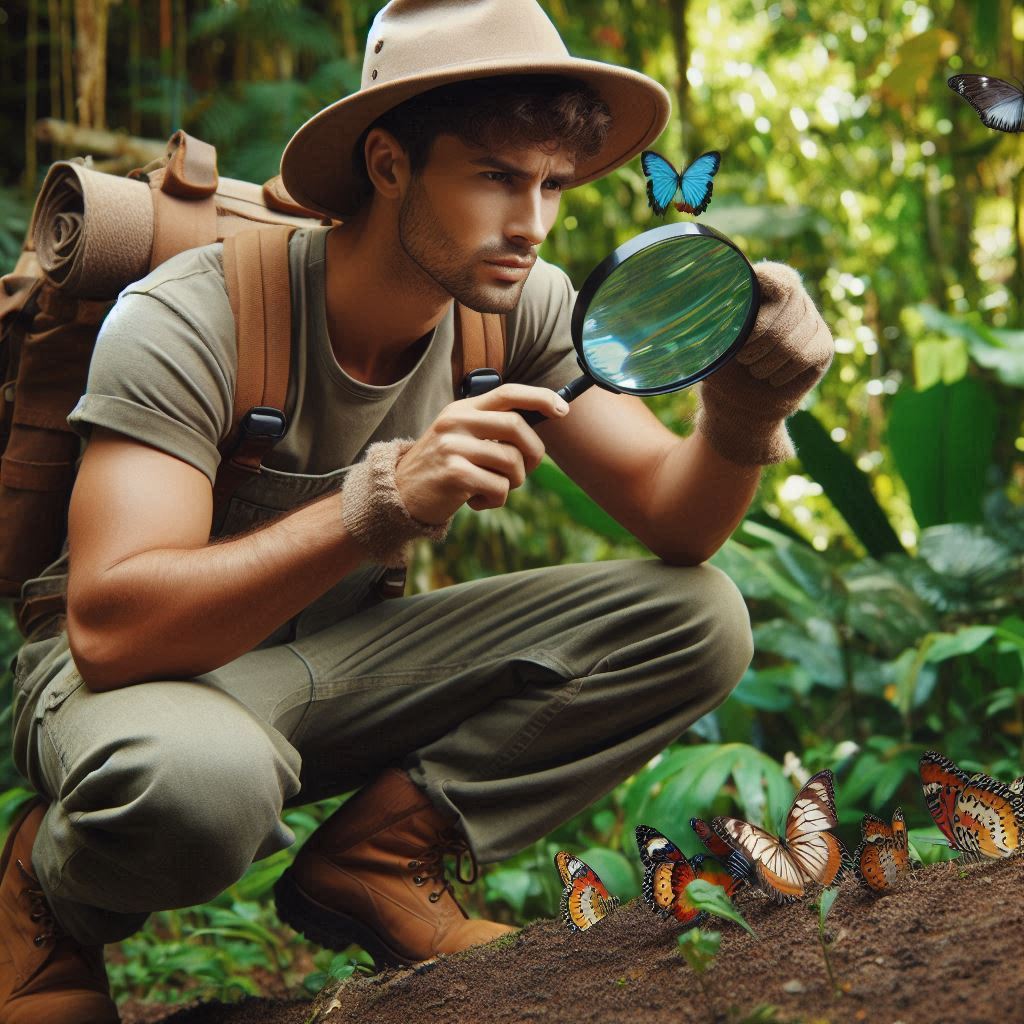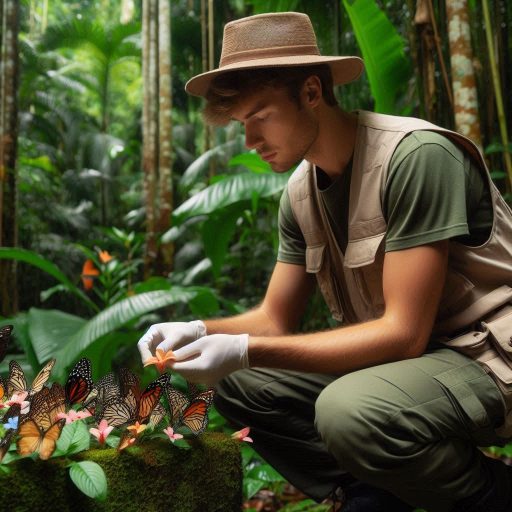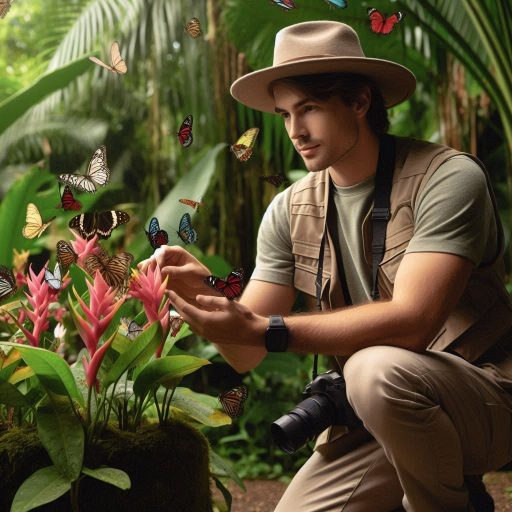Introduction
Zoology is essential for understanding animals and their habitats.
This dynamic field explores various aspects of animal life, including behavior, physiology, ecology, and conservation efforts.
By studying zoology, researchers can gain insights into the intricate relationships between species and their environments.
This knowledge is critical for developing effective conservation strategies and promoting biodiversity.
As global awareness of biodiversity and environmental issues increases, so does interest in zoology as a career.
Many students are drawn to the opportunity to study wildlife and contribute to conservation efforts that protect endangered species and their habitats.
Zoologists play critical roles in research, wildlife management, education, and public policy, making this a rewarding and impactful profession.
Consequently, numerous universities are enhancing their zoology programs to meet the growing demand for skilled professionals in this field.
These institutions offer comprehensive curricula that cover various topics, from animal behavior to ecological research methods.
Students benefit from hands-on research opportunities that allow them to apply their knowledge in real-world settings, often working alongside experienced faculty members.
Moreover, many top universities provide access to diverse ecosystems, enriching students’ learning experiences.
For example, institutions located near forests, wetlands, or marine environments offer unique field study opportunities.
University of California, Berkeley
Prestigious reputation of UC Berkeley’s zoology program
The University of California, Berkeley, boasts a prestigious reputation for its zoology program.
It ranks among the top institutions for biological sciences.
UC Berkeley’s zoology program offers a comprehensive curriculum.
Students gain a solid foundation in animal biology and ecology.
The program emphasizes research, critical thinking, and practical experience.
Berkeley’s faculty consists of world-renowned scientists and researchers.
Their expertise covers various areas, from evolutionary biology to conservation.
The university attracts top students from around the globe.
This diverse environment fosters collaboration and innovation in zoological studies.
UC Berkeley’s commitment to excellence sets it apart from other universities.
The various research opportunities available to students
UC Berkeley offers extensive research opportunities for zoology students.
Students can engage in fieldwork, laboratory studies, and data analysis.
The university’s strong emphasis on hands-on experience enhances learning outcomes.
Many research projects focus on pressing environmental issues.
These projects often involve collaborations with local and international organizations.
Students may study animal behavior, ecology, and conservation strategies.
They can also participate in studies related to habitat restoration and species preservation.
Berkeley’s facilities include state-of-the-art laboratories and research centers.
Students have access to resources for genetics, microbiology, and animal physiology research.
The campus’s proximity to diverse ecosystems also benefits field studies.
Students can explore nearby forests, wetlands, and marine environments.
Internships and volunteer opportunities further enrich the research experience.
Many students work with local zoos, aquariums, or conservation organizations.
These experiences provide practical insights into the field of zoology.
Notable professors or alumni in the field of zoology
UC Berkeley has produced numerous notable professors and alumni in zoology.
Many faculty members have made significant contributions to the field.
For example, Dr. Robert S. Etges is renowned for his work on evolutionary biology.
He has published extensively on animal behavior and ecology.
Another prominent professor, Dr. Kevin Padian, specializes in vertebrate paleontology.
His research focuses on the evolution of flight in birds and dinosaurs.
His work has influenced how scientists understand the transition from dinosaurs to birds.
UC Berkeley’s alumni have also made a lasting impact in zoology.
Notable alumni include Dr. Jane Goodall, famous for her groundbreaking research on chimpanzees.
Her work has changed how we understand animal behavior and conservation.
Another influential alum, Dr. John E. Baker, has contributed significantly to wildlife management and conservation efforts.
In review, UC Berkeley’s zoology program stands out for its prestigious reputation.
It offers various research opportunities and access to renowned faculty.
Students benefit from hands-on experiences and a strong network of professionals.
This combination prepares graduates for successful careers in zoology and related fields.
Read: Educational Path: Becoming a Geologist in the USA
Cornell University
Comprehensive Zoology Curriculum at Cornell
Cornell‘s zoology curriculum covers a wide array of subjects.
Students delve into animal biology, ecology, and behavior.
The program emphasizes both theoretical knowledge and practical applications.
Core courses include genetics, physiology, and evolutionary biology.
This diverse coursework equips students with a solid foundation in animal sciences.
Moreover, students benefit from interdisciplinary studies.
The curriculum encourages collaboration with other departments.
This approach enriches students’ understanding of zoology within broader scientific contexts.
Cornell also emphasizes the importance of research in the curriculum.
Students engage in research projects, allowing them to apply classroom knowledge.
Hands-On Learning Experiences Through Fieldwork and Internships
Hands-on learning is a hallmark of Cornell’s zoology program.
Students participate in fieldwork opportunities that enhance their education.
These experiences allow students to study animals in their natural habitats.
Fieldwork includes activities such as wildlife tracking and habitat assessment.
Internships also play a vital role in practical learning.
Cornell connects students with organizations for internship placements.
Students gain real-world experience working in zoos, wildlife parks, and conservation agencies.
These internships provide valuable networking opportunities and practical skills.
They also help students build a strong resume for future employment.
Additionally, Cornell hosts summer field courses.
These courses often take place in diverse ecosystems.
Students explore various environments while conducting research.
This immersive experience solidifies their understanding of zoological concepts.
Specializations and Concentrations Within the Zoology Program
Cornell offers several specializations within its zoology program.
Students can tailor their studies to match their interests.
Specializations include wildlife conservation, marine biology, and animal behavior.
These options allow students to focus on areas that align with their career goals.
The wildlife conservation concentration focuses on species preservation and habitat management.
Students learn strategies to protect endangered species and their environments.
Meanwhile, the marine biology specialization dives into ocean ecosystems and marine life.
Students explore critical topics like marine conservation and fisheries management.
The animal behavior concentration examines how animals interact with their environments.
Students study topics such as communication, social structures, and mating behaviors.
This specialization prepares graduates for careers in research, education, and wildlife management.
Basically, Cornell University offers an exceptional zoology program.
Its comprehensive curriculum, hands-on learning experiences, and diverse specializations prepare students for successful careers.
By choosing Cornell, students gain the knowledge and skills necessary to thrive in the field of zoology.
The combination of rigorous coursework and practical experiences makes this program one of the top choices in the U.S.
Aspiring zoologists will find ample opportunities to explore their passions and make a meaningful impact on animal sciences.
Read: Botany Career Fairs and Networking Events
University of Florida
Strong Focus on Wildlife Conservation and Ecology
UF‘s School of Forest, Fisheries, and Geomatics Sciences offers specialized zoology courses.
These courses emphasize the importance of biodiversity and species protection.
Students learn about the intricacies of ecosystems and how to manage them effectively.
The curriculum includes field studies and projects that promote real-world conservation efforts.
This practical approach prepares students to tackle current environmental challenges.
UF also partners with local organizations for wildlife conservation initiatives.
These partnerships provide students with opportunities to work on impactful projects.
For instance, students may participate in habitat restoration efforts or wildlife monitoring programs.
These experiences enhance their education and contribute positively to the community.
State-of-the-Art Facilities and Resources
The facilities at UF are state-of-the-art, providing students with exceptional resources.
The university houses advanced laboratories equipped with the latest technology.
These laboratories support a variety of research projects, from genetic studies to behavioral analyses.
Access to such resources allows students to conduct thorough investigations into animal biology.
Additionally, UF‘s field stations offer unique opportunities for hands-on learning.
These locations provide diverse environments for studying various species.
Students can explore wetlands, forests, and marine ecosystems.
Such experiences enrich their understanding of wildlife and its habitats.
Moreover, UF’s library system boasts extensive collections on zoology and related fields.
Students have access to a wealth of academic journals, books, and research materials.
This access supports their studies and encourages independent research projects.
Unique Research Projects and Initiatives
UF‘s zoology department is known for its innovative research projects.
One noteworthy initiative focuses on Florida’s endangered species, such as the Florida panther.
Researchers study their habitats, breeding patterns, and conservation strategies.
This research aims to improve population viability and enhance habitat protection.
Another exciting project involves the study of marine life in local waters.
Students and faculty collaborate to monitor fish populations and ecosystem health.
They analyze data to inform conservation strategies and fisheries management practices.
These unique research initiatives underscore UF‘s commitment to impactful zoology education.
Students gain valuable experience while contributing to vital conservation efforts.
Through its strong focus on wildlife conservation, state-of-the-art facilities, and innovative projects, UF prepares students for successful careers in zoology.
Read: Preparing for a Botany PhD: Tips and Advice

University of Washington
The Interdisciplinary Approach to Zoology at UW
At UW, students explore zoology through multiple lenses.
The curriculum includes courses in genetics, physiology, and animal behavior.
This diversity equips students with a comprehensive understanding of animal life.
Faculty members encourage collaboration across disciplines, fostering innovative research.
Students engage in hands-on learning experiences.
They participate in laboratory work and field studies that reinforce theoretical concepts.
This practical exposure enhances their problem-solving and analytical skills.
Graduates emerge well-prepared for careers in research, conservation, and education.
UW‘s commitment to interdisciplinary studies extends beyond the classroom.
The university promotes partnerships with other departments and colleges.
This collaboration enriches the academic environment and opens new research avenues.
Students gain access to a broader range of expertise and resources.
Diverse Range of Ecosystems and Wildlife Species in the Pacific Northwest
The Pacific Northwest is renowned for its diverse ecosystems and wildlife species.
This region features coastal habitats, temperate rainforests, and mountainous terrains.
Students at UW have the unique opportunity to study these environments firsthand.
The rich biodiversity includes numerous animal species, from marine life to terrestrial mammals.
Students engage in field studies to observe and document these species in their natural habitats.
Such experiences deepen their understanding of ecological interactions and conservation challenges.
Research in the Pacific Northwest focuses on critical issues, such as habitat preservation and species conservation.
Students often participate in studies examining the impacts of climate change on local wildlife.
This real-world context enhances their education and prepares them for future challenges in zoology.
Partnerships with Local Wildlife Organizations or Research Institutions
UW fosters strong partnerships with local wildlife organizations and research institutions.
These collaborations provide students with additional learning opportunities.
They often involve fieldwork, internships, and volunteer positions that enrich academic experiences.
Through these partnerships, students contribute to meaningful conservation efforts.
They work alongside professionals in the field, gaining invaluable insights and skills.
These experiences also enhance students’ resumes and networking opportunities in the zoology field.
For instance, UW collaborates with organizations focused on wildlife rehabilitation and habitat restoration.
Students gain hands-on experience, making a tangible impact on local ecosystems.
Such collaborations underscore the university‘s commitment to integrating education with practical applications.
In summary, the University of Washington offers a robust zoology program that emphasizes interdisciplinary learning.
Its location in the Pacific Northwest provides students with unique opportunities to study diverse ecosystems and wildlife species.
Through partnerships with local organizations, students gain practical experience and contribute to conservation efforts.
This comprehensive approach makes UW a top choice for aspiring zoologists.
Read: Interdisciplinary Research: Botany and Other Sciences
Harvard University
Harvard’s Esteemed Reputation in the Field of Biology and Zoology
Harvard’s Department of Organismic and Evolutionary Biology offers a robust zoology program.
The university’s comprehensive curriculum covers diverse topics, including animal behavior, physiology, and ecology.
Students benefit from learning under renowned faculty members who are leaders in their respective fields.
Harvard’s reputation extends beyond the classroom.
Graduates of its zoology program often secure prestigious positions in academia, research, and conservation.
The university’s extensive alumni network provides valuable connections and resources for current students.
Innovative Research Being Conducted by Faculty and Students
Innovative research plays a crucial role in Harvard’s zoology program.
Faculty members actively engage in groundbreaking studies that address pressing ecological and biological questions.
They explore various aspects of animal life, including evolutionary processes, biodiversity, and conservation strategies.
Students at Harvard also contribute to this research culture.
Undergraduate and graduate students often collaborate with faculty on research projects.
This hands-on experience allows students to develop practical skills while contributing to significant scientific discoveries.
The university hosts numerous research initiatives and centers dedicated to zoological studies.
For instance, the Harvard Museum of Comparative Zoology houses extensive collections that support research and education.
These resources provide students with unique opportunities to study diverse animal species.
Opportunities for Collaboration with Other Departments or Schools Within Harvard
Collaboration is a cornerstone of Harvard’s educational philosophy.
Zoology students have numerous opportunities to work with other departments and schools.
Interdisciplinary programs allow students to integrate knowledge from biology, environmental science, and public policy.
For example, the Harvard Forest and the Harvard John A.
Paulson School of Engineering and Applied Sciences offer collaborative research projects.
These initiatives allow students to address complex environmental challenges, combining zoological expertise with engineering solutions.
Additionally, the Harvard T.H. Chan School of Public Health provides opportunities for students to study the impacts of animal health on public health.
This interdisciplinary approach prepares students for diverse careers in conservation, research, and policy-making.
In essence, Harvard University stands out as a top choice for zoology degrees and programs.
Its esteemed reputation, innovative research, and collaborative opportunities set it apart.
Students at Harvard gain invaluable experience and connections, preparing them for successful careers in zoology and related fields.
With a commitment to advancing knowledge and addressing global challenges, Harvard remains a leader in the study of animal life.
Transform Your Career Today
Unlock a personalized career strategy that drives real results. Get tailored advice and a roadmap designed just for you.
Start NowTexas A&M University
Strong Emphasis on Field Research and Practical Experience at Texas A&M
Texas A&M University prioritizes field research and practical experience in its zoology programs.
Students have access to diverse ecosystems, including coastal wetlands, forests, and grasslands.
This diversity allows students to study various wildlife species and habitats firsthand.
The university‘s curriculum incorporates extensive fieldwork, ensuring students apply theoretical knowledge to real-world situations.
Students often participate in field courses, gaining valuable skills in data collection, analysis, and species identification.
These experiences enhance their understanding of zoological concepts and prepare them for careers in the field.
Additionally, Texas A&M encourages students to engage in independent research projects.
Faculty members support students as they design and execute their studies.
This hands-on approach fosters critical thinking and problem-solving skills, essential for a successful career in zoology.
Special Programs or Centers Dedicated to Zoology and Wildlife Conservation
Texas A&M hosts several specialized programs and centers dedicated to zoology and wildlife conservation.
The university’s Department of Wildlife and Fisheries Sciences focuses on research and education in wildlife management.
This department offers undergraduate and graduate degrees that emphasize conservation biology and ecological research.
One notable center is the Texas A&M Institute of Renewable Natural Resources.
This center conducts research on sustainable management practices for wildlife and ecosystems.
Students can collaborate with faculty members on projects addressing pressing conservation issues.
The university also offers programs that focus on the conservation of specific species.
For instance, students can participate in research on endangered species and habitat restoration initiatives.
These specialized programs provide valuable experience in conservation efforts, preparing students for impactful careers.
Unique Opportunities for Students to Work with Conservationists or Researchers in the Field
Students at Texas A&M benefit from unique opportunities to work alongside conservationists and researchers.
The university‘s strong connections with local and national conservation organizations enhance these experiences.
Students often participate in internships or volunteer opportunities with wildlife agencies, gaining practical skills in the field.
Furthermore, Texas A&M organizes workshops and seminars featuring guest speakers from various conservation organizations.
These events allow students to network with professionals and learn about current conservation challenges.
Such exposure can lead to internships, job offers, or collaborative research opportunities.
Additionally, students can engage in study abroad programs focused on international wildlife conservation.
These programs provide hands-on experience in diverse ecosystems worldwide, enriching their education and perspectives.
University of California, Davis
UC Davis’ Focus on Animal Behavior and Ecology in Their Zoology Program
UC Davis emphasizes animal behavior and ecology throughout its zoology curriculum.
The program provides students with a solid foundation in biological sciences.
It delves into the principles of animal behavior, evolution, and ecological systems.
This focus prepares students for careers in wildlife management, conservation, and research.
The faculty at UC Davis consists of renowned experts in various zoological fields.
They engage students through dynamic lectures and hands-on lab work.
This interactive approach fosters a deeper understanding of animal behavior and ecology.
Students learn to analyze complex biological systems and apply this knowledge to real-world challenges.
Opportunities for Students to Conduct Research in a Variety of Environments
UC Davis offers numerous opportunities for students to engage in research across diverse environments.
Students can participate in field studies, laboratory research, and community-based projects.
The university’s location in California provides access to various ecosystems, including forests, wetlands, and coastal regions.
Undergraduate students can work alongside faculty members on research projects.
These projects often focus on animal behavior, conservation strategies, and ecological impacts.
This hands-on experience enhances their academic knowledge and prepares them for future careers.
Additionally, students can present their research findings at national and international conferences.
The university also encourages internships with local wildlife organizations, government agencies, and conservation groups.
These internships allow students to gain practical experience while contributing to real-world conservation efforts.
This combination of research and fieldwork enriches the educational experience for zoology students at UC Davis.
Notable Partnerships or Collaborations Within the Department or With Other Universities
The zoology program at UC Davis benefits from notable partnerships and collaborations.
The department collaborates with various research institutions and organizations, both nationally and internationally.
These partnerships enhance the program‘s research capabilities and provide students with unique learning opportunities.
One prominent collaboration is with the California Academy of Sciences.
This partnership allows students to access additional resources and participate in joint research projects.
Students can engage in exciting fieldwork, learn from experts, and gain hands-on experience in a leading research environment.
Additionally, UC Davis maintains strong ties with other universities, fostering collaborative research initiatives.
These collaborations often involve joint research grants and projects, enriching the academic experience for students.
Generally, UC Davis offers a robust zoology program with a focus on animal behavior and ecology.
Students benefit from diverse research opportunities and partnerships that enhance their educational experience.
With a strong foundation in biological sciences, graduates are well-equipped for careers in zoology and related fields.
UC Davis stands out as a top choice for aspiring zoologists seeking a comprehensive education and hands-on experience.
Gain More Insights: Astronomy Career Paths: Jobs Beyond Academia
Conclusion
After exploring the top U.S. Universities for zoology degrees and programs, it is evident that places like Harvard University, Stanford University, and the University of California.
Berkeley offer exceptional opportunities for students interested in this field.
These universities provide cutting-edge research facilities, renowned faculty members, and a strong focus on hands-on learning experiences.
We highly encourage readers to further investigate these universities and consider pursuing a degree in zoology.
With the diverse range of courses, specialized research areas, and robust academic support, students can truly excel in their studies and make significant contributions to the field of zoology.
Graduates with a degree in zoology have promising career prospects, including opportunities in wildlife conservation, animal behavior research, environmental consulting, and more.
By obtaining a degree in zoology from one of these top universities, students can pave the way for a successful and fulfilling career in the field of animal science.
[E-Books for Sale]
The Big Book of 500 High-Paying Jobs in America: Unlock Your Earning Potential
$19.99 • 500 High-Paying Jobs • 330 pages
Explore 500 high-paying jobs in America and learn how to boost your career, earn more, and achieve success!
See All 500 High-Paying Jobs of this E-Book
1001 Professions Without a Degree: High-Paying American Jobs You Can Start Now
$19.99 • 1001 Professions Without a Degree • 174 pages
Discover 1001 high-paying jobs without a degree! Unlock career tips, skills, and success strategies for just $19.99!




